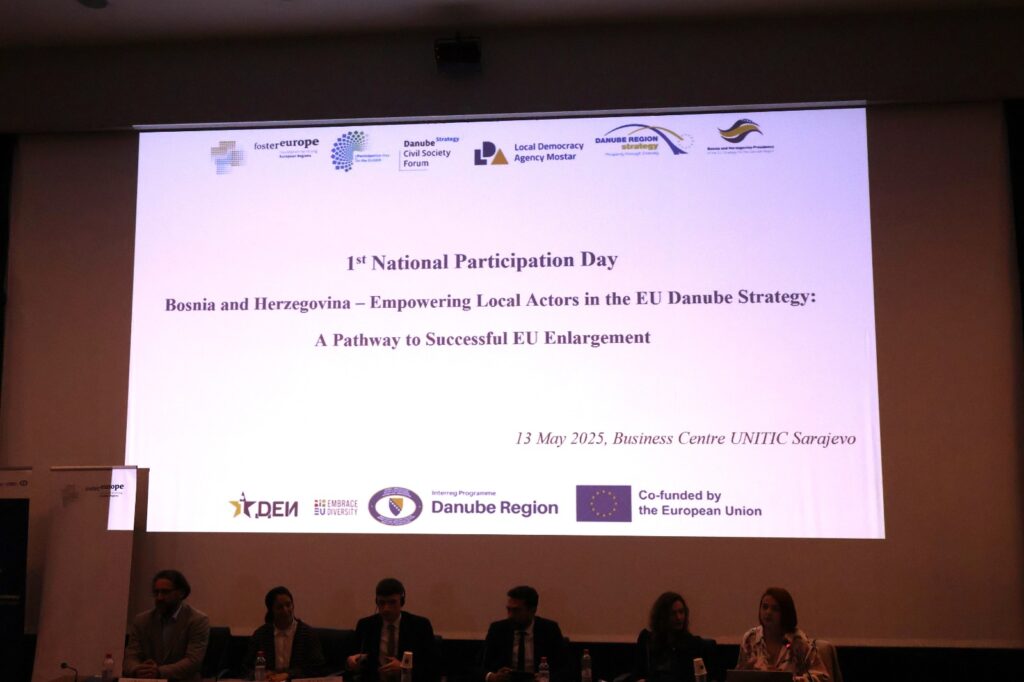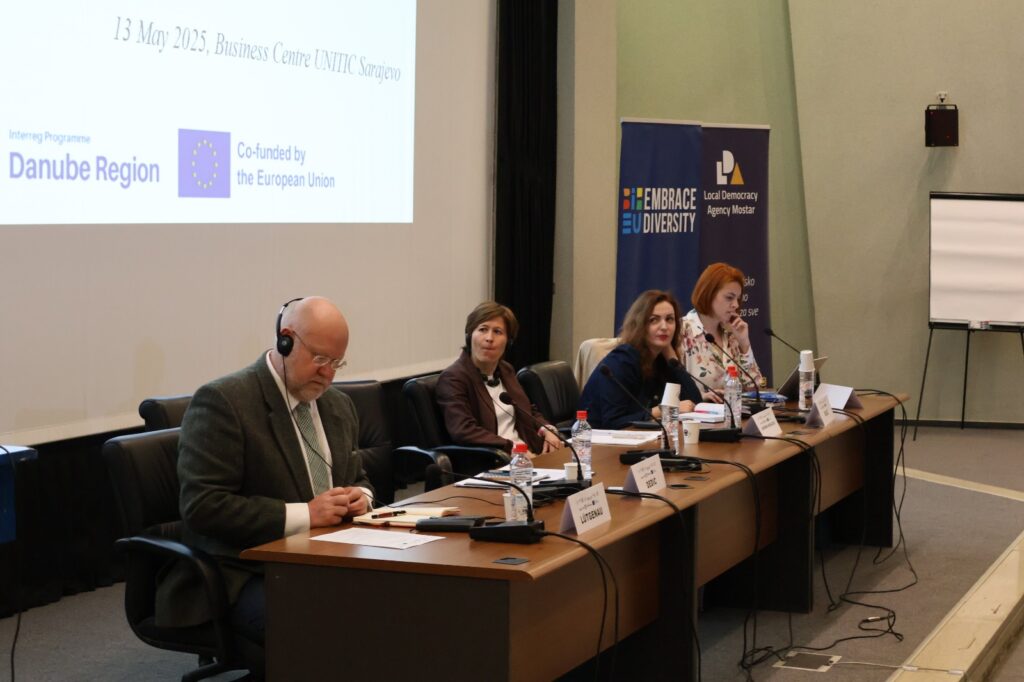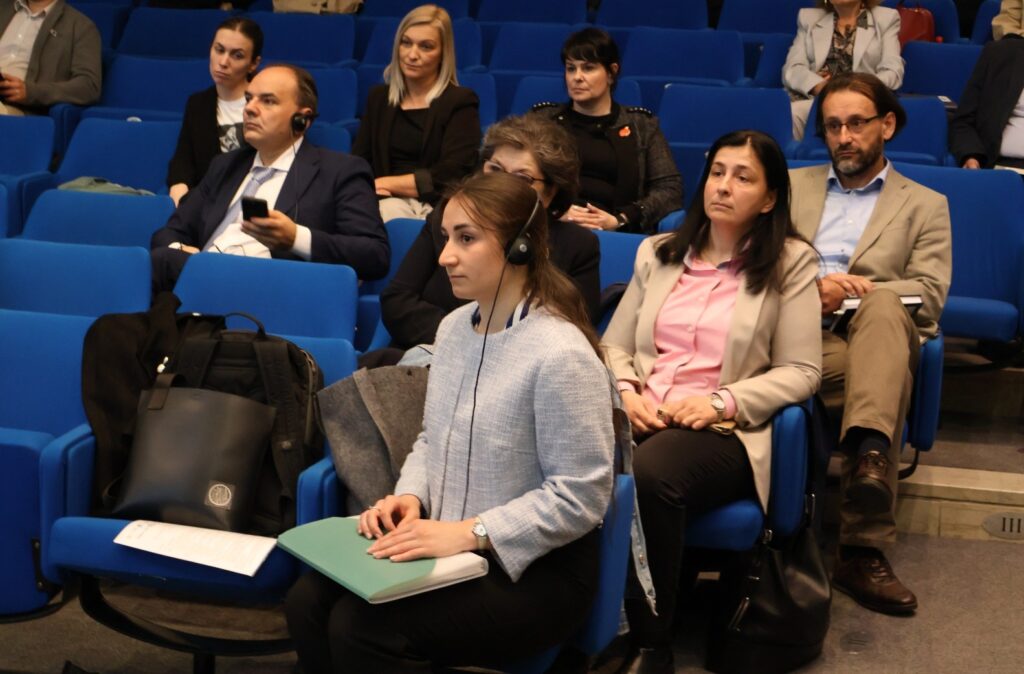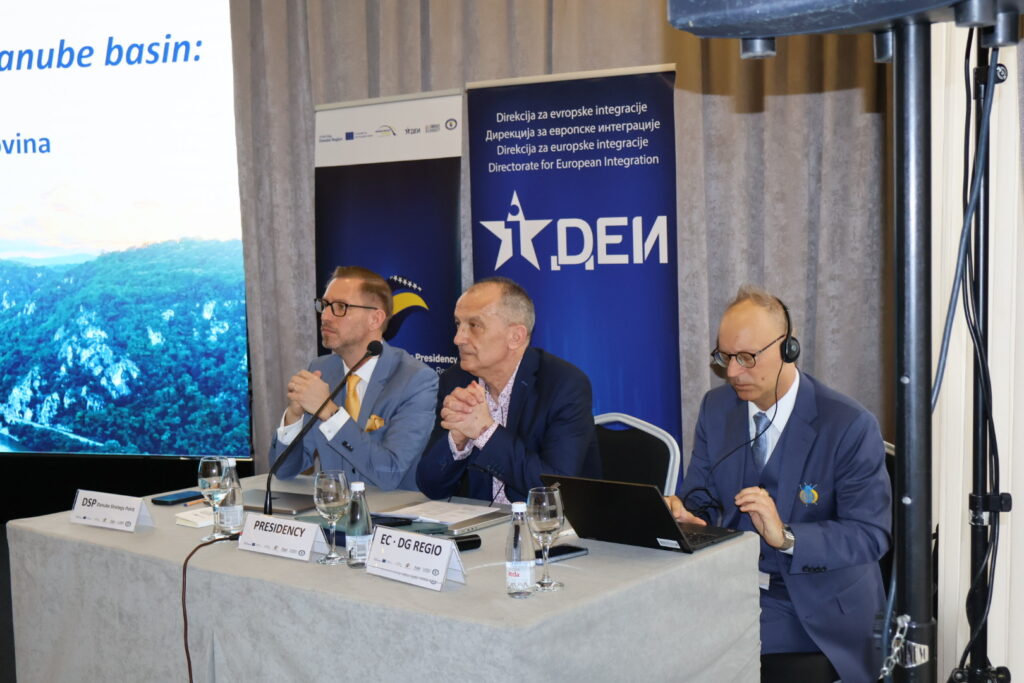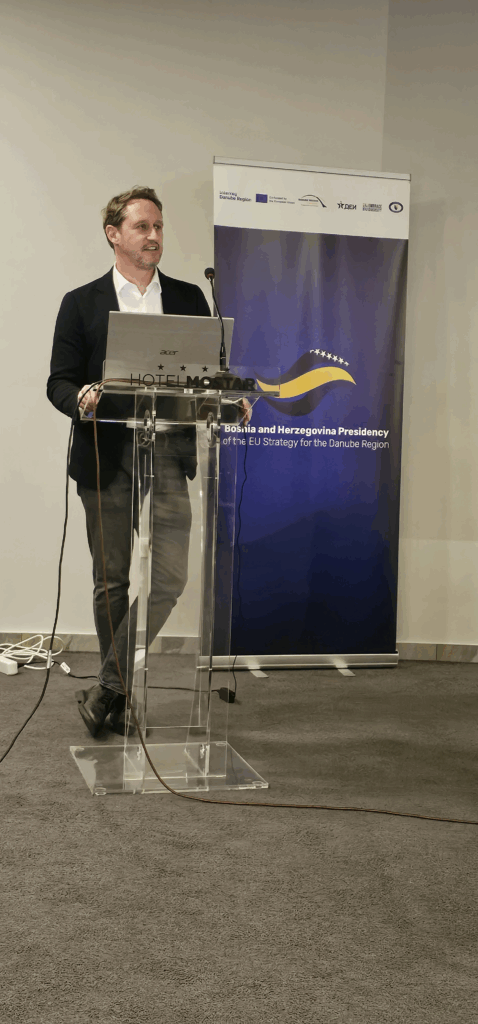Bosnia and Herzegovina holds the Presidency of the EU Strategy for the Danube Region from 1 January 2025 until 31 December 2025, taking over from Austria. The EUSDR, endorsed in June 2011 by the European Council, has been contributing to addressing common challenges Danube Region countries face.
Beyond the challenges knowing no borders like pollution, climate change, unemployment or a lack of connectivity, numerous new challenges emerged in the past years: the global financial crisis, challenges caused by migration and demographic changes, the COVID-19 pandemic, the Russian war of aggression against Ukraine, the impact of climate change to humans and nature and others. These crises have left deep marks on the Danube Region and its citizens in different areas. The only way to overcome them is through intensive cooperation and constructive dialogue within the entire Danube Region.
One of the noteworthy features of the EUSDR is that the Strategy brings together EU member states and EU accession countries, tackling issues of common interest on equal footing. Within the transformation processes in Europe, the process of EU enlargement has to gain stronger dynamics and reclaim its momentum. As the “Vienna Danube Declaration” from June 2024 states, “History has shown that EU membership is a catalyst for overcoming regional conflicts, promoting reconciliation, strengthening regional cooperation and development and accelerating internal institutional and economic reforms.”
The Russian Federation’s war of aggression against Ukraine, a member state of the EUSDR, has led to major consequences for the Danube Region, Europe and the world. Since the beginning of the aggression, Ukraine has been dealing with bloodshed, civilian casualties, destruction of civilian infrastructure, humanitarian emergencies, and an enormous number of refugees. All these terrible consequences demand the need for solidarity and cooperation both in the Danube Region and beyond.
All these challenges and global changes lead to major transformations within the Danube Region and the whole of Europe. The twelve thematic EUSDR Priority Areas provide wide opportunities for cooperation in making the Danube Region a place of stability, security and prosperity.
During its Presidency of the EUSDR, Bosnia and Herzegovina will build upon the remarkable achievements of previous EUSDR Presidencies and drive forward cooperation in the Danube Region for a better life for its citizens.
Bosnia and Herzegovina declares speeding up the European integration process as the top priority during its chairmanship of the EUSDR. To avoid the spread of enlargement fatigue, disbelief and loss of EU credibility, especially in the Western Balkans (given that the promise of the EU perspective was given to the people and countries in this Region during the Thessaloniki Summit already 21 years ago), the EU enlargement process must be revitalised. It is our obligation and responsibility to make every effort in bringing the EU enlargement process forward and sparing it from becoming a multigenerational task.
One effect of the slow European integration process is our young generation leaving the Region. Brain drain, the widening skills gap, depopulation, youth unemployment and the consequent demographic shifts – also in connection with labour market shortages and declining labour force – pose significant challenges within the Danube Region. This is why youth, education, skills and labour market policies will continue to be in focus of Bosnia and Herzegovina’s EUSDR Presidency priorities. The young generation could also make decisive steps toward completing the reconciliation processes in the Western Balkan region.
Thematic-wise, Bosnia and Herzegovina will focus on the following thematic priorities:
- Security, civil protection and disaster preparedness;
- Tourism and culture;
- Connectivity and green transition
- Education, skills and labour market
In relation to the area of security, besides police force cooperation, Bosnia and Herzegovina’s Presidency will especially contribute to the cooperation in areas of civil protection and disaster preparedness.
The next thematic priority will be tourism and culture: Bosnia and Herzegovina’s Presidency will continue promoting the Danube Region as a major tourist destination with manifold natural and cultural sites and historical heritages. The tourism sector was severely affected by the COVID-19 pandemic, and as the pandemic loses its global grip, the Region needs to continue developing innovative products and services to facilitate the tourism sector recovery in a sustainable manner. This includes green tourism as an inspiration for new tourist destinations, urban tourism connected with various festivals, Eno and gastro tourism, the influence of social networks on the creation of tourist brands, etc. Strengthening this sector’s resilience through innovations and educational activities will be targeted to avoid similar situations.
Another thematic priority is connectivity and green transition within the Region, with a particular focus on digital and energy connectivity (regional interconnections development, optimisation of renewable energy sources, promotion of regional energy markets, energy storage, implementation of the EU’s Emissions Trading System (ETS) for road transport and EU’s Carbon Border Adjustment Mechanism (CBAM)). One of the areas that will be tackled under this thematic priority is the digitalisation of businesses and public services as an instrument of improving the Danube Region’s efficiency, sustainability, and competitiveness. Another area that will be covered is green and digital skills in the Danube Region as a remedy for the widening skills gap and brain drain as well as the driver of competitiveness and facilitator of fair and sustainable employment.
Regarding education and labour market thematic priority, efforts will focus on enhancing the performance of education, training and labour market systems within the Danube Region through targeted policies and closer cooperation with the academia. Building on the European Pillar of Social Rights, the aim is to create equal opportunities and provide access to quality and inclusive education, training and employment for all citizens within the Region by improving skills and learning outcomes for employability, entrepreneurship and innovation.
During its Presidency mandate, Bosnia and Herzegovina will spare no effort to contribute with specific activities and proposals that may attract stakeholders to work on synergies in bringing the regional contribution to the SDG UN Agenda 2030. It will not be feasible to address SDG-related challenges globally and in the EU (especially in the light of the European Green Deal) without the involvement of major economic players, namely enterprises. Therefore, a special focus will be paid to the application of the European Sustainability Reporting Standards (ESRS). The ESRS require companies operating in the EU and accession countries to assume accountability for the effects of their operations on the environment and society.
Bosnia and Herzegovina will also devote special attention to gender equality strengthening the role of women in the Danube Region and implementing the UN SDGs in the Danube Region as important cross-cutting issues. In this context, the focus will be on equality between women and men in the labour market, reducing the gender pay gap and providing equal access to education.
During its chairmanship of the EUSDR, Bosnia and Herzegovina will pay special attention to the following institutional goals:
- stronger involvement of the EU Commission’s DG NEAR and related line DGs in the implementation of the EUSDR;
- supporting the upcoming processes towards the new Cohesion Policy and further enhancing the process of embedding EUSDR into EU funding mechanisms, thus laying the ground for the availability of funding sources needed for the implementation of the EUSDR beyond 2027. Special attention will be paid to actions in connection with the next IPA and NDICI planning and programming;
- exploring the opportunities arising from the new Growth Plan for the Western Balkans that can potentially contribute to the accelerated implementation of the EUSDR.
Being a member of two EU macro-regional strategies (EU MRS), Bosnia and Herzegovina will work on further enhancing the cooperation between the EUSDR and the other three EU MRS. Especially since five EUSDR member states participate in the implementation of the EU Strategy for the Adriatic-Ionian Region (EUSAIR), mutual cooperation, capacity building, knowledge transfer and exchange of best practices will stand at the core of this endeavour (e.g. Cooperation within the EU MRS 4 TRIO Presidencies format). Furthermore, Bosnia and Herzegovina will enhance collaboration between EUSDR and other neighbouring regions’ relevant strategies aiming to promote the regional implementation of UN SDGs, particularly the South East Europe 2030 Strategy.
Some activities and events will be organised in cooperation with other EUSDR member countries and international organisations, like the Regional Cooperation Council, highlighting the nature of EUSDR as a framework for cooperation. The 2025 Presidency will also put a special focus on Cross-MRS activities, especially with the EU Strategy for the Adriatic-Ionian Region (EUSAIR), providing room for mutual learning and exchange of experiences.
In relation to the strengthening of the parliamentary dimension of the EUSDR, in the coming months, Bosnia and Herzegovina will consider the possibility of organising the Conference of the Speakers of the Danube Region Parliaments (Parliamentarians Conference).
The main event of the 2025 EUSDR Presidency of Bosnia and Herzegovina will be the 14th EUSDR Annual Forum, which will take place in the country’s capital, Sarajevo (5-6 November 2025, together with the 12th Danube Participation Day on 4 November 2025). The event will mark a paramount of the Presidency term by synergising the implemented activities and gathering the stakeholders of the Danube Region and beyond.
List of events under the Bosnian and Herzegovinian EUSDR Presidency 2025. The list is subject to updates (last update 06.03.2025).



